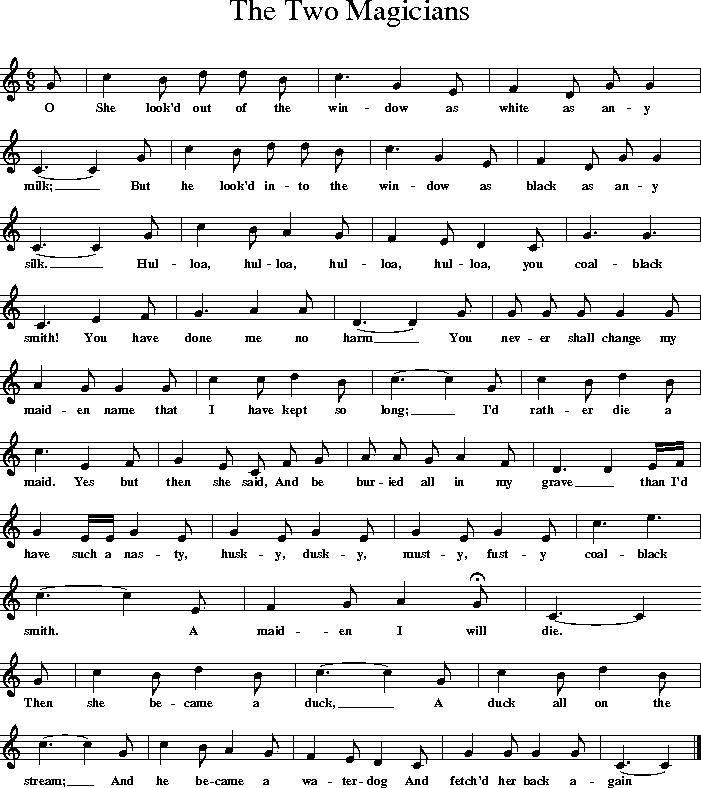The Two Magicians- Sparks (Minehead) 1904
According to Malcolm Douglas: Sharp published the full text as he had it from Mr. Sparks, except for the final line of the refrain, which (pesumably to make better sense?) he changed to A maiden I will die, though his source had actually sung My maiden name shall die.
Notes from One Hundred English Folksongs, edited by Cecil Sharp (1916):
No. 19. THE TWO MAGICIANS.
Words and tune from Mr. Sparks, blacksmith, of Minehead.
The words of this ballad were first printed in 1828 in Buchan's Ancient Ballads and Songs, Vol. I, p. 24. In a note the Editor adds :—" There is a novelty in this legendary ballad very amusing, and it must be very old—I never saw anything in print which had the smallest resemblance to it."
The words are reprinted in Whitelaw's Book of Scottish Ballads (1875) and in Brimley Johnson's Popular British Ballads (1894). Mr. Sparks's version is very different from that given by Buchan, although the theme of the two songs is the same.
After noting the song at Minehead I questioned many Somerset singers about it, but, except Mrs. Welch of He Breuers, no one had any knowledge of it; and Mrs. Welch could recall none of the tune, and only a line or so of the words.
The tune is not an old one, and it is manifestly much more modern than the words.
Except that Mr. Marson has made one or two slight alterations in the words, they are given in the text precisely as Mr. Sparks sang them. In Child's English and Scottish Ballads I, 244, the editor prints Buchan's version and says :—
"This is a base born cousin of a pretty ballad known over all Southern Europe and elsewhere, and in especially graceful forms in France."
"The French ballad generally begins with a young man's announcing that he has won a mistress, and intends to pay her a visit on Sunday, or to give her an aubade. She declines his visit, or his music. To avoid him she will turn e.g., into a rose; then he will turn bee and kiss her. She will turn quail; he sportsman, and bag her. She will turn carp ; he angler, and catch her. She will turn hare; and he hound. She will turn Nun; and he priest and confess her day and night. She will fall sick; he will watch with her or be her doctor. She will become a star; he a cloud, and muffle her. She will die; he will turn earth into which they will put her, or into St. Peter, and receive her into Paradise. In the end she says, 1 Since you are inevitable, you may as well have me as another ;' or more complaisantly ' Je me donnerai a toi, puisque tu m'aimes tant.'"
The ballad in some such form as this is known in Spain, Italy, Roumania, Greece, Moravia, Poland and Servia. In Clouston's Popular Tales and Fiction there is an interesting chapter on Magical Transformations and Magical Conflict." Mr. Kidson writes :—" There is a similar story of a battle of transformation between two magicians in a story in the Arabian Nights' Entertainment." The ballad is certainly very ancient.

She looked out of the window
As white as any milk
He looked into the window
As black as any silk
Refrain: "Hulloa, hulloa, hulloa, hulloa
You coal black smith
You have done me no harm
You never shall change my maiden name
That I have kept so long
I'd rather die a maid,"
Yes, but then she said,
"And be buried all in my grave,
Than I'd have such a nasty,
Husky, dusky, musty, fusky
Coal black smith!
A maiden I will die!"
Then she became a duck,
A duck all on the stream
And he became a water-dog
And fetched her back again
Refrain
Then she became a hare,
A hare upon the plain,
And he became a greyhound dog
And fetched her back again.
Refrain
Then she became a fly
A fly all in the air
And he became a spider
And fetched her to his lair
Refrain